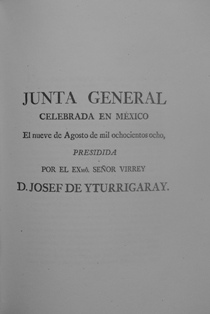Political Culture in the Spanish Crisis of 1808: Mexico City's experience.
Political culture in the Spanish crisis of 1808: the Mexico City experience.

My MA thesis revisited the events which took place in Mexico City between July and September 1808 as a result of the arrival of news of the dynastic crisis taking place in Peninsular Spain. My work was based on sources found in the three main collections of documents pertaining to the topic: the Archivo Histórico Nacional in Madrid, the Archivo General de la Nación in Mexico City and the Lilly Library, at the University of Indiana Bloomington, where the Viceroy’s original notebook of materials relating to his four juntas and most of Francisco Primo de Verdad’s manuscripts are hold.
The first part of my thesis reconstructed the events of July-September highlighting issues which have received little attention in the past: the centrality of Mexico City as the connection point between the Spanish Caribbean and the Spanish provinces in the Pacific Rim; the specific weight of New Spain in the discourse of national supremacy put forward by Seville’s Junta; the actual make up and prosopography of the 86 individuals who were convened to the four juntas organized by Viceroy de Iturrigaray and; the dynamics and language used in the written votes issued by these men after the third junta.
The second part of my thesis revolves around the construction of the indictment against de Iturrigaray and the first months of Pedro Garibay’s administration. It looks at whether the new government did believe the former Viceroy and the city council had been guilty of treason to the king. The analysis focuses on the actions undertaken by the new administration over the first two weeks after the coup which deposed Viceroy de Iturrigaray, the communications it held with other provinces after the coup, the use of Mexico City’s gazette, official announcements and decrees, in trying to win over public opinion and thwart any possible counter-coup, and the collection of evidence sent to Spain as proof of the Viceroy’s wrongdoings.
